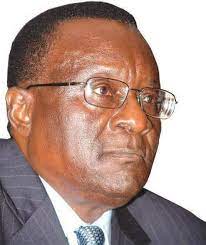Introduction
Chief Abdul-Ganiyu “Gani” Oyesola Fawehinmi, GCON, SAN (April 22, 1938 – September 5, 2009), was a Nigerian legal titan, human rights crusader, and pro bono advocate whose relentless pursuit of justice transformed Nigeria’s socio-political landscape. Known as the “Senior Advocate of the Masses,” Fawehinmi’s fearless battles against military and civilian oppression, coupled with his philanthropy and intellectual contributions, made him a national icon. His life, marked by over 5,000 lawsuits and 36 arrests, embodies the struggle for democracy, the rule of law, and the rights of the downtrodden.
Early Life and Education
Born in Ondo, Ondo State, to Chief Saheed Tugbobo Fawehinmi, a timber magnate and Muslim chieftain, and Munirat Fawehinmi, Gani inherited a legacy of civic activism. His grandfather, Chief Lisa Alujanu Fawehinmi, fought British colonial rule in the 19th century. Educated at Ansar-Ud-Deen Primary School (1947–1953) and Victory College, Ikare (1954–1958), Gani earned the nickname “Nation” for his avid interest in legal and political affairs, reading newspapers like Daily Times and West African Pilot. In 1961, he enrolled at Holborn College of Law, University of London, but faced financial hardship after his father died in 1963. Working as a toilet cleaner at Russell Square Hotel, he funded his degree, returning to Nigeria in 1964 and being called to the bar in 1965.
Legal Career and Human Rights Advocacy
Fawehinmi’s legal career began at his brother’s firm before he established Gani Fawehinmi Chambers in Lagos in 1965, which grew to employ over 200 staff. His breakthrough came in 1969 with the pro bono case of Bala Abashe, a factory worker suing a government official for adultery and assault. Despite nine months’ detention, Fawehinmi’s victory over legal giant Rotimi Williams skyrocketed his reputation. He handled over 5,700 briefs, 1,500 of them pro bono, defending the poor, deceived, and persecuted. Notable cases include representing journalist Dele Giwa, killed by a parcel bomb in 1986, and challenging the 1993 annulment of MKO Abiola’s presidential election victory. He also defended Ken Saro-Wiwa, withdrawing when the tribunal’s bias became evident, and sued over the deaths of Abiola, Kudirat Abiola, and Alfred Rewane.
Fawehinmi’s activism targeted military dictatorships, enduring 12 years in detention across various prisons. His passport was seized, his chambers ransacked, and his Surulere library nearly burned. Yet, he remained undaunted, filing lawsuits against civilian corruption, including one week before he died in 2009. In 1994, he founded the National Conscience Party (NCP), running for president in 2003 to protest Nigeria’s “pork-barrel politics,” holding rallies in Lagos’s Ajegunle slum to symbolize solidarity with the masses.
Philanthropy and Intellectual Contributions
A compassionate philanthropist, Fawehinmi established a scholarship scheme in 1971, supporting over 1,000 indigent students, some of whom became doctors and lawyers. He fed street beggars monthly and, in one instance, funded surgery for a widow’s son with a severe eye condition, granting scholarships to her four children. His Nigerian Weekly Law Reports, launched in 1986, revolutionized legal reporting, making judgments accessible and ending privileged lawyers’ monopolies. The Gani Fawehinmi Library, established in 1965 and relocated to Alausa, Ikeja, by 2012, houses over one million books and archives, the largest in Nigeria. He authored works like The Murder of Dele Giwa (1988) and mentored left-leaning lawyers and academics.
Recognition and Legacy
Fawehinmi’s defiance earned him global acclaim. He won the 1993 Bruno Kreisky Prize, dedicating it to Nigeria’s human rights organizations, and received the 1994 International Bar Association’s Bernard Simmons Award and the 1996 American Bar Association Award. Denied the Senior Advocate of Nigeria (SAN) title for years due to his activism, he was honored by Obafemi Awolowo University students as “Senior Advocate of the Masses” (SAM) in 1988, a title he cherished. He finally received the SAN in 2001 and was posthumously awarded the Grand Commander of the Order of the Niger (GCON) in 2018. He rejected the Order of the Federal Republic in 2008, protesting Nigeria’s misrule.
Personal Life and Challenges
Married twice to Ganiat Bukun and Abike Fawehinmi, Gani fathered 14 children, including Muhammed and Basirat Fawehinmi Biobaku. A principled Muslim, he faced relentless persecution: beaten, exiled within Nigeria, and targeted in a climate of assassination. In 1984, he defied a Nigerian Bar Association directive to represent clients in military tribunals, believing in justice for the accused, earning a place on the NBA’s “dishonour roll.” Diagnosed with lung cancer, he died on September 5, 2009, at 71. His chambers were closed a year later, per his directive, to preserve his legacy from misuse.
Recent Tributes
In September 2024, Peter Obi honored Fawehinmi’s legacy at the opening of the Gani Fawehinmi Library and Gallery in Alausa, Lagos, launching two books: Chief Gani Fawehinmi: The Enigma and Gani Fawehinmi Library and Gallery. Posts on X praise his pro bono work, noting his billionaire status revealed in his will, underscoring his selflessness. Others highlight his restraint in critiquing the judiciary, contrasting with modern activist lawyers.
Conclusion
Gani Fawehinmi’s life was a relentless crusade for justice, democracy, and the marginalized. His pro bono advocacy, legal innovations, and fearless defiance of tyranny made him a “loud conscience” alongside figures like Wole Soyinka. Despite imprisonment and persecution, he never wavered, leaving a legacy of scholarships, a monumental library, and a blueprint for legal activism. As Nigeria grapples with governance challenges, Fawehinmi’s example remains a clarion call for courage and compassion, ensuring his place among the nation’s greatest heroes.
Sources: The Guardian, The Independent, Wikipedia, Bruno Kreisky Foundation, LinkedIn, Punch Newspapers, Premium Times, RNN.ng, Fatherland Gazette, Encomium, Fidson Healthcare, Modupe Apoola Encyclopedia, LifeAndTimes News.


















